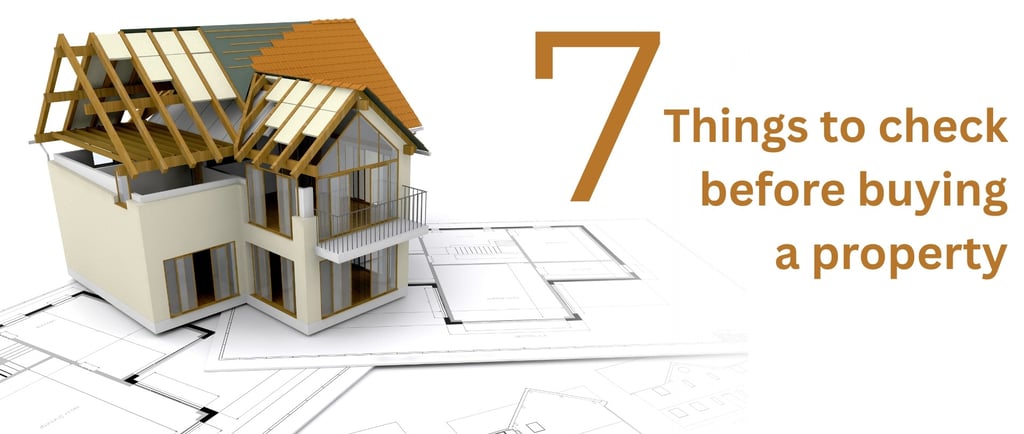7 Things to Check Before Buying a Property
5/3/20252 min read


7 Things to Check Before Buying a Property
Buying a property is one of the most significant investments of your life. Whether you're a first-time homebuyer or an experienced investor, there are certain factors you must thoroughly check to ensure you're making a sound decision. Here's a comprehensive guide to help you navigate the process.
1. Location – The Most Important Factor
The location of the property will have the most significant impact on its future value, rentability, and your quality of life. Look for:
Proximity to work, schools, and essential services like hospitals and markets.
The future growth potential of the area — Is it a developing area with infrastructure projects underway?
Traffic and connectivity — Public transportation options and major road networks.
2. Legal Documentation & Ownership
Ensure the property has clear legal titles and is free from disputes. Here's what to verify:
Sale deed – Confirm the seller is the rightful owner and has the legal right to sell.
Encumbrance certificate – Verify that the property is free of any legal liabilities or mortgages.
Land use and zoning permissions – Check if the land is designated for residential use (or commercial if buying for investment purposes).
3. Property Condition & Age
The condition of the property plays a crucial role in determining its long-term maintenance costs and value:
Age of the property – Older properties may require more maintenance.
Structural integrity – Check the walls, ceiling, plumbing, and electrical systems for any visible signs of wear or damage.
Renovations – Ensure any renovations made by the current owner are legal and up to code.
4. Price Comparison & Market Research
Before finalizing any deal, ensure the property is priced fairly:
Compare similar properties in the same locality to ensure you're paying a competitive price.
Evaluate market trends — Is the area appreciating in value, or is the market stagnating?
Hidden costs — Consider additional costs like registration fees, stamp duty, maintenance charges, and property taxes.
5. Builder Reputation & Project Status (For New Projects)
If you're buying from a developer, thoroughly research the builder’s track record:
Check if the builder has completed projects on time and maintained quality standards.
Review customer feedback and ratings of the builder's past projects.
Ensure the project is legally approved and has obtained all necessary permissions and clearances from local authorities.
6. Amenities & Infrastructure
Review the amenities offered and the quality of infrastructure in the area:
Community facilities like parks, gyms, swimming pools, and clubhouses — are they properly maintained?
Utilities — Ensure water supply, electricity, and waste management are reliable.
Security features — Is the property secured with CCTV, 24/7 guards, and controlled access points?
7. Resale Value & Future Growth Potential
Consider the resale value of the property:
Will the property be easy to sell if needed in the future?
Evaluate future urban development plans in the area, like new roads, metro stations, or malls.
Rental yield – If you're looking for investment, check the demand for rental properties in the area and the potential rental income.
